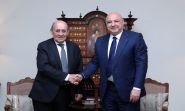
Let’s be clear—no more avoiding the issue or making compromises. The time for indulgence and indecisiveness has passed, and it must never return. Complacency and weakness are no longer acceptable, nor should they ever be again.
For the past 20 years—since 2005, when Hezbollah seized control of the local political scene—and more broadly for over half a century, since the ill-fated 1969 Cairo Agreement with armed Palestinian factions, the Lebanese people have paid the price for pointless wars they neither wanted nor supported. Wars with no end in sight, except to serve the hollow geopolitical ambitions of regional powers.
It is long overdue for the Lebanese people to aspire to nothing more than a normal life.
In the context of widespread frustration, now at its peak, the recent mission in Beirut by the US President’s Deputy Special Envoy for the Middle East, Morgan Ortagus, can be rightfully interpreted. The mission likely conveyed a firm message to Lebanese leaders and senior officials regarding Hezbollah’s military arsenal, its illegal covert funding sources and the essential reforms that must be addressed.
It is important to emphasize that any effort at economic and financial recovery will remain futile as long as the issue of sovereignty—specifically, the weapons held by the Iran-backed party—remains unresolved. Even if, in an ideal scenario, all presidential, executive, legislative, economic, financial, military and security powers were entrusted to the most virtuous individuals, the country would quickly fall back into deadlock, stagnation and chronic instability if Hezbollah maintains its weapons, continues its militia-like behavior and pursues a course that solely serves its regional backers. Recent years have proven this point beyond doubt.
Certain figures within the upper echelons of power and the pro-Iranian establishment advocate for a “national dialogue” aimed at discussing a “defense strategy” that could address the issue of Hezbollah’s weapons. At this stage, it is concerning that those behind this proposal remain entrenched in such deception. When a political faction lies shamelessly and persistently, making dishonesty the cornerstone of its political conduct, the most troubling issue is not simply that it has lied, but that it has become utterly untrustworthy, to borrow a sentiment from Friedrich Nietzsche.
It is worth noting that in June 2006, political leaders and key figures from across Lebanon gathered under the leadership of House Speaker Nabih Berri to specifically discuss a defense strategy. During this “dialogue conference,” a Hezbollah leader, the late Hassan Nasrallah, stressed the importance of avoiding any provocative actions in southern Lebanon that might disrupt the summer season. Yet, just two weeks later, on July 12, 2006, Hezbollah triggered a devastating war with Israel that would last over a month. Since then, and for more than 19 years, “national conferences” and repeated calls for the formulation of a “defense strategy” have been held throughout various presidential terms, all without result…
Moreover, at every pivotal moment, Hezbollah has repeatedly broken its promises and disregarded the solemn commitments made to both Arab and international institutions. This was evident in several instances, including after August 2006 with Resolution 1701, in January 2011 when it violated the Doha Agreement (May 2008), in June 2012 following the Baabda Declaration led by President Michel Sleiman, and most recently, with the terms of the ceasefire negotiated with Israel in November 2024.
These actions, tainted with deception, were likely at play—albeit subtly—during the discussions with US Envoy Morgan Ortagus in Beirut. Some government officials, with their unfortunate tendency toward complacency, should keep this firmly in mind at all times.
Despite the past disasters, hardline figures within the Iranian camp continue to argue that Hezbollah’s military arsenal is necessary to preserve the party's position and role—and, in their view, that of the Shiite community—on the political stage, alongside the (alleged) fight against Israel.
Those advocating for an irrational and extreme strategy, disconnected from current realities, would do well to reflect on the words of the late ulema Mohammed Hassan el-Amine, whose fourth anniversary is being commemorated: “We will be strong when we can achieve our scientific, technological and developmental revolution.” This simple statement clearly points to the path forward, one that avoids ideological rhetoric and focuses on rebuilding and lifting the community from the abyss created by the Tehran-aligned faction over the years.




Comments